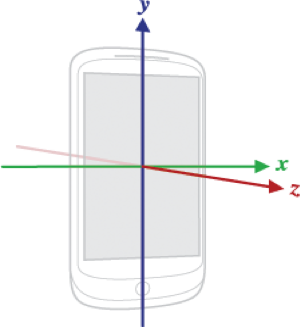Sensors
Different devices have avariety of sensorsthat can be accessed via the Sensor framework.
Link:http://developer.android.com/guide/topics/sensors/sensors_overview.html
Possible tasks related to sensors include:
- List available sensors
- Determine sensor capabilities (range, resolution, etc.)
- Acquire raw sensor data
- Register sensor event listeners
Common sensors that devices have available are for temperature, light, pressure, acceleration, motion, and orientation. Here's a list of guides:
- Motion Sensors:http://developer.android.com/guide/topics/sensors/sensors_motion.html
- Position Sensors:http://developer.android.com/guide/topics/sensors/sensors_position.html
- Environment Sensors:http://developer.android.com/guide/topics/sensors/sensors_environment.html
Sensor Coordinate System

A list of steps involved with getting data from sensors are :
Initiate a SensorManager:
private SensorManager sensorManager;
Get a list of available sensors in onCreate:
sensorManager= (SensorManager) getSystemService(Context.SENSOR_SERVICE);
// Get the default sensor of specified type
List<Sensor> deviceSensors =mSensorManager.getSensorList(Sensor.TYPE_GRAVITY);
for( Sensor sensor : deviceSensors){
Log.e("SEnsor Found", sensor.toString());
}
Get a specific sensor:
Sensor lightSensor= sensorManager.getDefaultSensor(Sensor.TYPE_PROXIMITY);
Following are some properties available on a sensor are:
getResolution
getPower
getVendor
getVersion
Register for the right sensor in life cycle:
@Override
protected voidonResume() {
super.onResume();
if(mLight!=null) {
sensorManager.registerListener(lightSensorListener, lightSensor, SensorManager.SENSOR_DELAY_NORMAL);
}
}
@Override
protected void onPause() {
super.onPause();
if(lightSensor!=null) {
sensorManager.unregisterListener(mLightSensorListener);
}
}
Handle Callback:
This callback is responsible for getting us the values whenever the sensor updates.
private SensorEventListener lightSensorListener = newSensorEventListener() {
@Override
public voidonSensorChanged(SensorEvent event) {
Log.d("MY_APP", event.toString());
Log.e("event", event.values[0] +""); //the values array is a float array representing the value across different coordinate systems
}
@Override
public void onAccuracyChanged(Sensor sensor, int accuracy) {
Log.d("MY_APP", sensor.toString() +" - "+ accuracy);
}
};
These two functions implemented are called when:
- A sensor's accuracy changes:
In this case the system invokes the onAccuracyChanged() method, providing you with a reference to the Sensor object that changed and the new accuracy of the sensor.
Accuracy is represented by one of four status constants:
- SENSOR_STATUS_ACCURACY_LOW
- SENSOR_STATUS_ACCURACY_MEDIUM
- SENSOR_STATUS_ACCURACY_HIGH
-
- A sensor reports a new value:
In this case the system invokes the onSensorChanged() method, providing you with a SensorEvent object.
A SensorEvent object contains information about the new sensor data, including:
- The accuracy of the data
- The sensor that generated the data
- The timestamp at which the data was generated
- The new data that the sensor recorded.
For every sensor, event contains an array of values, each of which has a different meaning, for example (environmental sensors).
Note : To declare that a sensor is absolutely required by your application:
<uses-feature
android:name="android.hardware.sensor.accelerometer"
android:required="true"/>
If the device does not support the above hardware, your application won’t show in their play store (incompatible)